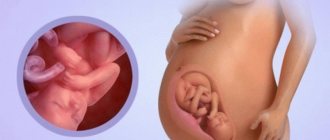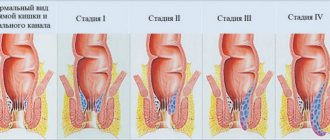One of the most sensitive issues that women are sometimes embarrassed to discuss even with a doctor is the problem of hemorrhoids. This problem can be not only physical, but also psychological in nature. We want to support everyone who may encounter this problem during pregnancy or after childbirth, tell why it occurs, whether it can affect the course of pregnancy and what to do about it in order to improve the quality of their life in one of its most important periods.
Why hemorrhoids may appear during pregnancy
One of the main reasons for the development or exacerbation of hemorrhoids can be constipation and associated straining3. Intestinal dysfunction is one of the common problems during pregnancy4.
And it’s not just about errors in nutrition or the habit of “eating for two,” which expectant mothers sometimes refer to. Pregnancy in general is accompanied by strong changes in the functioning of the body’s hormonal system4.
The following factors can cause irregular bowel movements and constipation in pregnant women4:
- increased concentration of the sex hormone progesterone;
- decreased concentration of the hormone motilin, which is produced in the cells of the small intestine;
- natural changes in blood supply and intestinal regulation. In addition, during pregnancy, the development of hemorrhoids can also be triggered by physical factors - in particular, increased pressure on the walls of the rectum from the uterus or increased intra-abdominal pressure4.
We care about your health
Hemorrhoids during pregnancy - cure the mother, do not harm the baby
Pregnant women always think first of all about the health of the unborn baby, forgetting to pay due attention to their body. One of the common diseases during this period is hemorrhoids. And it is very important to cure the mother, not harm the child and forget about this problem forever.
Symptoms of hemorrhoids and several stages of development
Hemorrhoids in pregnant women are difficult to miss. It develops gradually. If the disease is detected at the first stage, treatment will not take much time, and the discomfort will disappear on the second day. There are several stages of hemorrhoids, and you need to focus on the signs of the initial stage:
- nagging pain in the anus;
- discomfort and unpleasant sensations that do not go away after bowel movement;
- weak and unsystematic bleeding;
- the appearance of nodules;
- the beginning of the inflammatory process in the mucous membrane.
If you consult a doctor at this stage, properly prescribed treatment and prevention, hemorrhoids will disappear forever, without causing trouble to the expectant mother. The second stage is itching in the anus, increased pain, growth and loss of nodes.
Attention! It is not recommended to self-medicate at any stage of the disease. This is especially true for women who are expecting a child. Incorrectly selected drugs or traditional medicine can forever deprive a woman of the joys of motherhood.
The third stage requires intervention: the nodes already have to be adjusted by hand, and the pain in the anus intensifies. Hemorrhoids during pregnancy in the fourth stage are very complex and dangerous for mother and baby. Thrombosis and heavy bleeding may occur, requiring serious medical and surgical intervention.
The development of hemorrhoids in expectant mothers - the main factors
As soon as the blood supply to the rectum is disrupted and the vessels become inelastic, weak, and begin to stretch, there is a risk of inflammatory processes. To cure hemorrhoids in pregnant women, the doctor needs to find out the reasons that led to it. There are four main factors that trigger the onset of a serious illness.
Chronic constipation. During pregnancy, intestinal tone is weakened, constipation is common, and the distension of the intestinal walls increases. Tension also increases during emptying - nodules, cracks, and bleeding appear.
Low activity and sedentary lifestyle. Before treating hemorrhoids in pregnant women, the doctor conducts a survey. If a woman moves little, blood stagnates in the pelvis, which causes thrombosis of the venous vessels.
Poor circulation due to pressure from the enlarged uterus on the vena cava. This leads not only to inflammation in the rectum, but also to stagnation of blood in the legs.
Nutrition. Spicy, highly salted and smoked foods cause blood to rush to the pelvic organs. If you eat such food often, the blood stagnates and lumps form.
If hemorrhoids occur during pregnancy, treatment should only be under the supervision of a doctor. These risk factors, often in combination with hormonal changes in the body of a pregnant woman, without prevention and timely medical intervention, will lead to a serious illness that can develop into a chronic one.
If time was lost during pregnancy, then hemorrhoids after childbirth can become a chronic disease. It is important not to miss the moment and contact a good specialist who will quickly put the mother’s body in order.
Types of hemorrhoids in pregnant women
There are several types of hemorrhoids. If the nodes are located inside - internal. They are located in the middle of the intestine, but can sometimes fall out under severe stress. In external cases, the nodules are located around the anus. They can be easily palpated and visible to the naked eye.
Treatment of hemorrhoids after childbirth or during pregnancy also depends on whether it is congenital or acquired, acute or chronic. The chronic form lasts several months or years if the woman does not see a doctor. During a relapse, unpleasant sensations and nagging pain appear in the lower abdomen, in the area of the anus. Minor or heavy bleeding may occur with constipation. In the intervals between exacerbations, the pain subsides and the discomfort disappears. A period of remission begins, which can also last a very long time.
Chronic hemorrhoids after pregnancy or in pregnant women can develop in four stages.
- Passage of blood during bowel movements.
- Knots falling out.
- The nodes have to be set, they do not hide themselves.
- With any slight load - coughing, sneezing, lifting a child in your arms, the knots fall out and it is impossible to set them back on your own.
In order to prevent the last stage of the disease and permanently cure hemorrhoids after childbirth, treatment must be carried out by qualified doctors at a licensed medical institution.
Treatment of hemorrhoids with medications and surgery
As soon as the first signs of the disease are detected, a diagnosis is made, the condition of the mother and fetus is examined, and treatment is prescribed. While a woman is carrying a baby, she may be prescribed gels, suppositories, ointments and special creams. The following types of treatment can also be used as prescribed by a doctor:
- phlebotropic drugs that improve lymph outflow and increase vascular elasticity;
- microenemas to make stool soft and relieve intestinal inflammation;
- vitamin complexes to improve blood circulation;
- laxatives based on natural ingredients;
- suppositories and ointments that eliminate pain and relieve inflammation.
If the disease is advanced and treatment is impossible during pregnancy, an experienced proctologist knows how to cure hemorrhoids after childbirth using surgery. During gestation, surgical methods are used in extreme cases and with the mandatory use of anesthesia. This is hemming and removing knots or tightening them using special latex rings. If it is necessary to achieve complete death of the nodes, sclerotherapy or photocoagulation is done.
A woman who is expecting a baby or a young mother after giving birth should not be afraid to go to the clinic. The doctor will select treatment methods that will be successful in eliminating a serious disease without harming either the mother or the baby.
How hemorrhoids can affect pregnancy
Hemorrhoids can worsen the quality of life of any person, and especially during pregnancy, because a woman wants to enjoy her condition.
Hemorrhoids can cause inconvenience and discomfort, and may also be accompanied by pain. In addition, it can cause difficulties not only physiological, but also psychological.
Firstly, many are embarrassed to talk about this delicate problem, discuss it with anyone, thus making it difficult to find the right solution. Secondly, the expectant mother may worry about the possible impact of hemorrhoids, constipation and related straining on the condition of her baby.
In addition, if hemorrhoids appeared during pregnancy, they may worsen after childbirth. Therefore, during pregnancy, when such a problem appears, it is important to take measures to improve its course in order to minimize the risk of exacerbation after childbirth.
Ointments against hemorrhoids
Heparin ointment
Heparin ointment is the most popular among the Russian population for treating symptoms of hemorrhoids during pregnancy. Its advantage is the virtual absence of contraindications, both for the pregnant woman and for the baby inside her. The ointment is recommended for use after childbirth. Its constituent component is heparin, which has an anticoagulant effect on the body. Under the influence of heparin, the inflammation that has arisen in the rectum is eliminated and the process of resorption of the resulting blood clots is observed.
How to deal with hemorrhoids
It is important for pregnant women to pay attention to their diet, difficulties with bowel movements, stool retention, and discomfort when going to the toilet. Remember: it is better to start working on the situation at the first unpleasant manifestations in order to reduce the risks of developing hemorrhoids and establish a natural physiological process
The most important conditions for the comprehensive fight against hemorrhoids and improving the quality of life of a pregnant woman are:
- increasing physical activity (of course, if possible);
- balanced diet rich in fiber;
- consuming a sufficient amount of fluid in order to normalize the functioning of the gastrointestinal tract, soften stools and mildly comfortable cleansing of the intestines2,4. Moreover, when pregnancy is accompanied by constipation, it is important to pay special attention to this.
Methods for preventing hemorrhoids in pregnant women
Proper nutrition and adherence to a daily routine are very important in the prevention of hemorrhoids.
Compliance with medical recommendations will prevent the development of the disease and avoid unpleasant consequences. Since pregnant women are initially at risk, the doctor will prescribe a whole range of measures that will prevent the development of the disease. If discomfort occurs, it is necessary to undergo an examination; based on the results, a diagnosis will be made and treatment will be prescribed. There are several main areas of prevention:
- Proper nutrition and adherence to a daily routine. Pregnant women need to include plenty of fruits and vegetables in their diet, as well as cereals to prevent constipation. It is necessary to limit spicy and fatty foods, spicy seasonings as much as possible; carbonated drinks and alcohol are completely excluded from the diet. All this contributes to normal bowel function and prevents the development of hemorrhoids.
- Therapeutic exercise plays a big role in ensuring normal blood flow in the pelvic organs. Even simple hygienic exercises in the morning help prevent stagnation of blood in the veins, thereby reducing the risk of hemorrhoids. The doctor will select the necessary exercises, and you will have to perform them during the entire waiting period. Therapeutic exercise should not overload the body; a reasonable approach and a sense of proportion are important.
- Strict adherence to personal hygiene rules is important. It is necessary to rinse with cool water after bowel movements, in addition, ascending irrigation of the anal area will be useful. To do this, simply turn the shower so that its jets are directed upward.
- It is necessary to avoid hypothermia, which can also lead to various problems. Women in general, and pregnant women in particular, should not sit on a cold surface; during the months of expecting a baby, it is better to avoid long journeys on foot and heavy physical exertion.
Preventive measures can also be prescribed after diagnosis in combination with medications.
Complex therapy allows you to achieve good results and get rid of unpleasant symptoms for a long time.











